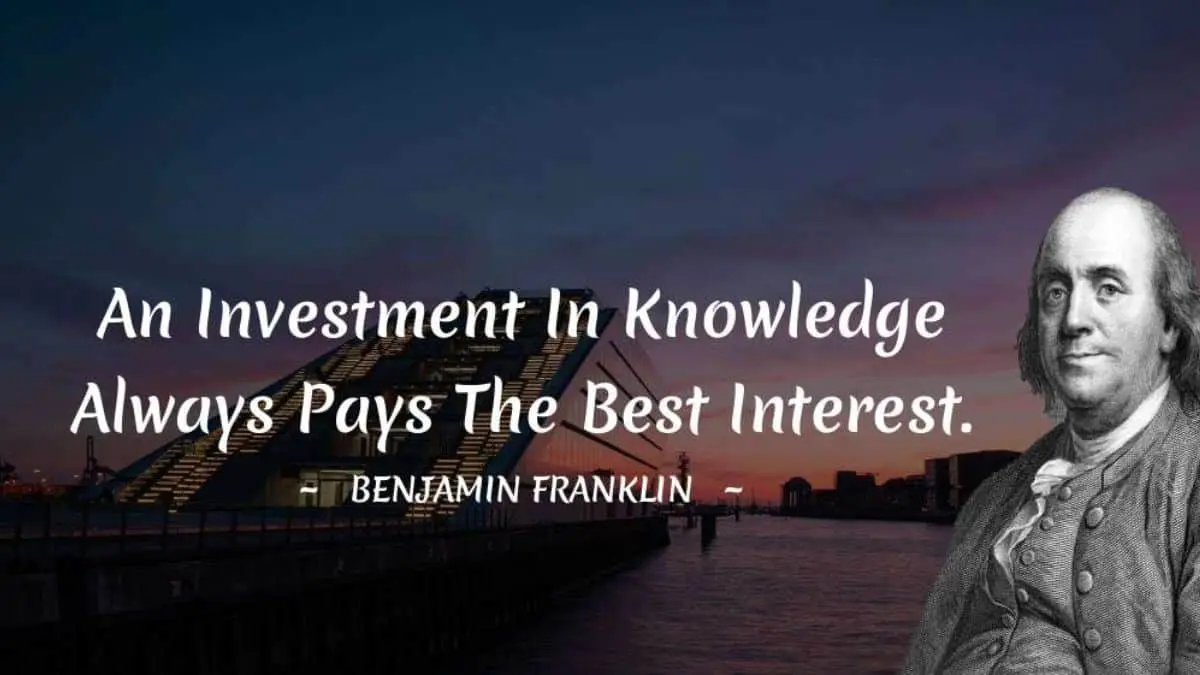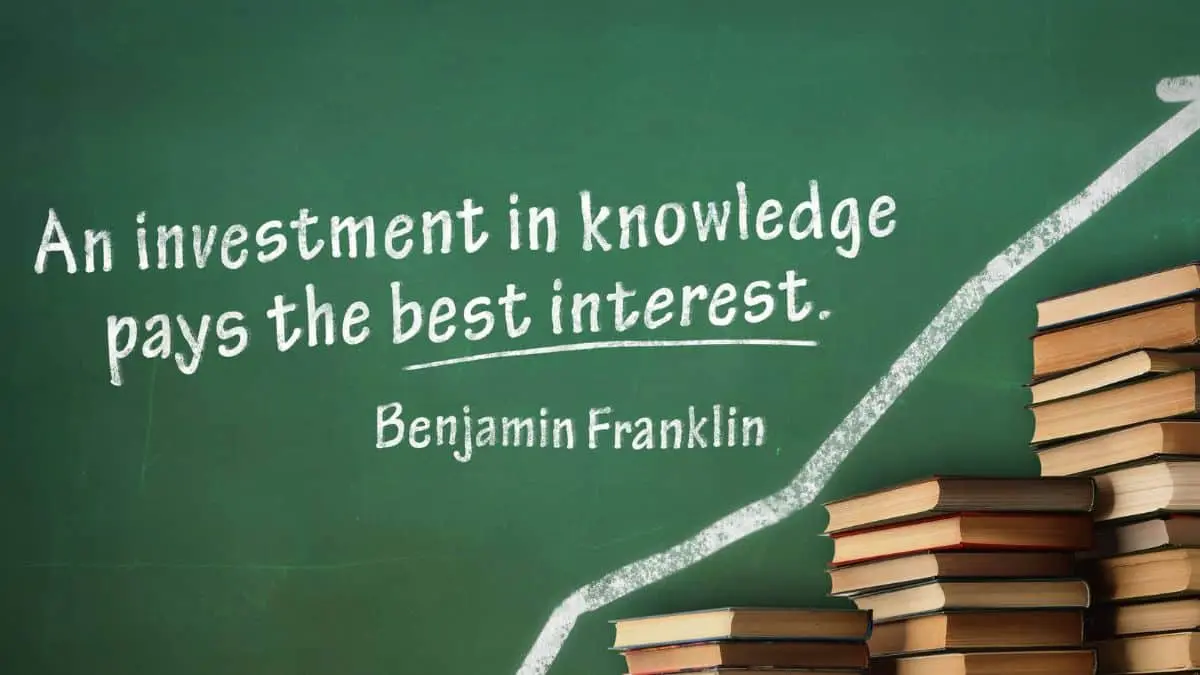In a rapidly evolving world, where change is the only constant, the timeless wisdom encapsulated in the adage “An investment in knowledge pays the best interest” remains more relevant than ever. Attributed to Benjamin Franklin, one of the Founding Fathers of the United States, this quote transcends time and context to offer profound insight into the value of education and learning. In this blog, we delve into the various dimensions of this statement, exploring how investing in knowledge is not merely a pathway to financial success but a foundation for societal progress, personal growth, and global development.
An investment in knowledge pays the best interest
The Tangible Benefits of Educational Investment
Education, often seen as the cornerstone of personal development and societal progress, is not just a tool for intellectual enrichment but a fundamental investment with tangible, measurable benefits. These benefits manifest in various forms, from economic upliftment to technological advancements, creating a ripple effect that touches every aspect of human life. In this section, we will explore these tangible benefits in detail.
Economic Upliftment and Career Advancement
One of the most direct and measurable impacts of educational investment is its correlation with economic prosperity. Education, particularly higher education, has long been linked to better job prospects, higher earnings, and increased workplace productivity.
- Higher Earnings: Statistics consistently indicate that individuals with higher levels of education earn more over their lifetime. According to a report by the U.S. Bureau of Labor Statistics, in 2020, workers with a bachelor’s degree had median weekly earnings of $1,305, compared to $781 for those with only a high school diploma. This difference translates into significantly higher lifetime earnings.
- Lower Unemployment Rates: Education also plays a crucial role in employment stability. The same report highlighted that the unemployment rate for individuals with a bachelor’s degree was substantially lower (3.7%) compared to those with only a high school diploma (6.7%). This trend is observed globally, indicating that education is a critical factor in job security.
- Career Progression: Beyond initial employment, education is a key driver of career advancement. Higher educational qualifications often open doors to managerial and professional roles, offering opportunities for further growth and development.
Technological Advancement and Innovation
In an era where technology shapes the future, the role of education in driving innovation is unmistakable. Knowledge and research are the backbones of technological progress, and educational institutions are the breeding grounds for new ideas and discoveries.
- Research and Development: Universities and research institutes are at the forefront of scientific and technological research. Investments in these educational sectors lead to groundbreaking discoveries, from medical advancements to new technologies in energy, transportation, and communication.
- Entrepreneurship and Start-ups: Education also fosters entrepreneurship. Many successful start-ups have their roots in academic projects or are founded by educated individuals who leverage their knowledge to innovate. Silicon Valley, for instance, has a dense concentration of highly educated individuals and is known as a hub of innovation and technology.
- Global Competitiveness: On a broader scale, a country’s educational standards are often directly linked to its competitiveness on the global stage. Nations that prioritize educational investment tend to lead in technological advancements, making them more competitive in the global market.
Socio-Economic Impact
The socio-economic impact of educational investment is profound and far-reaching. Education is a powerful tool in reducing poverty, as it equips individuals with the skills and knowledge necessary to improve their economic situation.
- Breaking the Poverty Cycle: Education is one of the most effective ways to break the cycle of poverty. Educated individuals are more likely to find employment, earn a stable income, and thus lift themselves and their families out of poverty.
- Economic Growth: On a macroeconomic level, a more educated workforce contributes to the overall economic growth of a country. It leads to a more skilled labor force, which in turn attracts businesses and stimulates economic activities.

The Intangible Benefits of Knowledge Investment
While the tangible benefits of education, such as economic prosperity and career advancement, are often emphasized, the intangible benefits of investing in knowledge are equally significant. These intangible benefits, though less quantifiable, profoundly impact personal development, societal well-being, and the overall fabric of humanity. Let’s explore some of these invaluable, albeit less visible, rewards of knowledge investment.
Personal Development and Empowerment
Education is a powerful tool for personal empowerment, fostering qualities that are essential for individuals to reach their full potential.
- Critical Thinking and Problem Solving: Education nurtures critical thinking skills, enabling individuals to analyze situations, think independently, and solve complex problems. This skill is crucial not just in professional settings but also in everyday life decisions.
- Improved Communication Skills: Knowledge enhances one’s ability to communicate effectively. It helps in articulating thoughts clearly and understanding others’ perspectives, which is vital in personal relationships and professional environments.
- Increased Self-confidence and Resilience: Education often leads to higher self-esteem and confidence. Being knowledgeable can make individuals feel more competent and prepared to face challenges, thereby fostering resilience.
- Lifelong Learning Attitude: Education instills a love for lifelong learning. This ongoing quest for knowledge keeps individuals mentally active and engaged, continually expanding their horizons.
Social and Cultural Impact
The ripple effect of education extends far beyond the individual, influencing society and culture in profound ways.
- Social Awareness and Global Understanding: Education opens one’s eyes to different cultures, histories, and global issues, promoting a sense of social awareness and empathy. Educated individuals are more likely to be tolerant and understanding of diverse perspectives.
- Promotion of Civic Engagement: People with higher levels of education are often more engaged in civic activities. They are more likely to vote, volunteer, and participate in community activities, contributing to a healthier democracy.
- Enhancement of Cultural Appreciation: Education can foster an appreciation for the arts, literature, and history, enriching cultural understanding and expression.
Mental Health and Well-being
The impact of education on mental health and overall well-being is a vital, though often overlooked, aspect.
- Stress Reduction and Mental Stability: Knowledge can provide a sense of security and stability, which contributes to better mental health. Educated individuals often have better coping mechanisms for stress.
- Enrichment of Personal Life: Education enriches one’s personal life by expanding interests and hobbies. It opens doors to a wide range of recreational and cultural activities, enhancing quality of life.
Broader Societal Benefits
Investing in education has broader societal benefits that contribute to the overall health and progress of communities.
- Reduction in Crime Rates: Education is linked to lower crime rates. Knowledge and skills acquired through education provide legitimate avenues for success, reducing the likelihood of criminal behavior.
- Healthier Societies: Educated individuals tend to make better health choices, leading to healthier lifestyles. This has a knock-on effect on public health and healthcare costs.
Global Perspective: Education as a Tool for Development
Education is universally acknowledged as a key driver of development, with its influence transcending national borders and cultural barriers. In a global context, education acts as a powerful tool for sustainable development, impacting economies, societies, and the environment. This section explores the role of education in developing nations, the contributions of international organizations, and the challenges and opportunities that lie ahead.
Educational Investment in Developing Nations
The impact of education in developing countries is profound and multifaceted.
- Economic Growth and Poverty Reduction: Education is a crucial factor in economic development. In developing nations, access to quality education can significantly impact poverty reduction. A UNESCO report highlighted that if all students in low-income countries acquired basic reading skills, it could lift 171 million people out of poverty.
- Empowerment and Equality: Education, especially for girls and women, is a catalyst for empowerment. It leads to greater participation in the workforce and decision-making processes. Educated women are more likely to have fewer children, better health outcomes for their families, and break cycles of poverty.
- Community Development: In rural and underprivileged areas, education plays a key role in community development. It enables individuals to access better job opportunities, contribute to local economies, and participate actively in community life.
The Role of International Organizations and NGOs
Various international organizations and non-governmental organizations (NGOs) play a pivotal role in promoting and facilitating education globally.
- UNESCO and Global Education Initiatives: UNESCO (United Nations Educational, Scientific and Cultural Organization) leads worldwide endeavors to achieve educational access for all. Initiatives like the Education for All (EFA) movement and the United Nations’ Sustainable Development Goal 4 (Quality Education) focus on inclusive and equitable quality education.
- NGOs and Grassroots Efforts: NGOs often work at the grassroots level to provide education in remote or conflict-affected regions. They help in setting up schools, training teachers, and providing learning materials.
- Public-Private Partnerships: Collaborations between governments, private sector entities, and NGOs have been successful in implementing educational projects, bringing in diverse expertise and resources.

Conclusion: A Universal Truth
As we reflect on the multifaceted impact of education, from its tangible benefits in economic and career advancement to its intangible rewards in personal development and societal progress, it becomes evident that Benjamin Franklin’s assertion, “An investment in knowledge pays the best interest,” is not merely an insightful aphorism but a universal truth.
The Timeless Value of Knowledge
The value of knowledge transcends eras, cultures, and geographical boundaries. In every corner of the world and in every aspect of life, education proves to be a powerful catalyst for change and development. It is a unique investment that consistently yields dividends, not just for the individual who receives it but for society at large.
Beyond Financial Metrics
While the economic benefits of education are significant and well-documented, the broader impacts of knowledge investment are even more profound. Education nurtures critical thinking, fosters empathy, and builds a foundation for a more informed and tolerant society. It equips individuals not just with vocational skills, but with the wisdom to navigate life’s challenges, the empathy to understand diverse perspectives, and the vision to innovate for a better future.
A Collective Responsibility
Recognizing education as a universal good underscores the collective responsibility of governments, communities, and individuals worldwide. Ensuring access to quality education for all is not just a moral imperative but a practical necessity for global development and harmony. The challenges in achieving this—ranging from resource limitations in developing nations to the need for educational reforms in developed countries—call for a concerted, global effort.
Investing in the Future
As we forge ahead into an increasingly complex and interconnected world, the importance of education becomes even more paramount. It is an investment in the future—a future where knowledge and wisdom become the driving forces for innovation, equity, and sustainability.
The Ripple Effect of Knowledge
The impact of education is like a ripple effect—starting with the individual and eventually touching the lives of many. Each person’s educational journey contributes to a larger narrative of progress and development. In this light, an investment in knowledge is not just the best interest for the individual, but the most rewarding investment for humanity.
Also Read: A little progress each day adds up to big results









